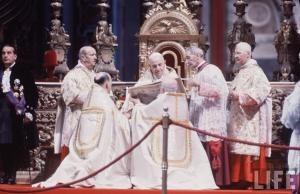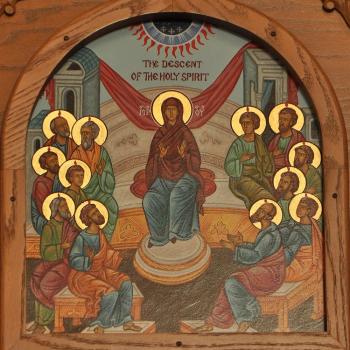
It should not be surprising that for the 60th anniversary of the opening of Vatican Council II, critics of its implementation once again attacked the notion that the faithful should follow the “spirit of Vatican II.” They show, in and through their criticism, that their understanding of dogmatic theology, and how it is engaged, is limited at best, and heretical at worst. Not only do they want to restrict the Christian faith to dogmatic declarations, they think those declarations must be interpreted in the most simplistic manner possible. If we did as they wanted, we would find ourselves coming to the end of the Christian faith, as what they offer is not the power and spiritual life needed for Christianity to thrive. For, as great theologians in the Christian tradition understood, what is key is the meaning intended by such declarations, not the words used. Paul certainly taught this as he warned that textual literalism would restrict the Christian faith and leave it spirituality dead as it would no longer have the ability to apprehend the greater mystery was given over to it in the incarnation:
Such is the confidence that we have through Christ toward God. Not that we are competent of ourselves to claim anything as coming from us; our competence is from God, who has made us competent to be ministers of a new covenant, not in a written code but in the Spirit; for the written code kills, but the Spirit gives life (2 Cor. 3:4-6 RSV).
We must not follow any legalistic ideology which would restrict our understanding of conciliar definitions, or of Scripture itself, to the dead letter, for then, as Paul said, we shall not have the spiritual life God intends for us. To understand any dogmatic text we must begin with the realization that the words used in it are limited in value, and are meant to point to something beyond themselves. If we restrict ourselves simply to words themselves, and think they establish the truth instead as serve as its pointers, we would end up cutting ourselves off from the truth (as we will conflate a relative presentation of the truth with the absolute truth, a confusion which is the foundation for all idolatry). Thus, Nicholas of Cusa wisely wrote, “However, someone who desires to grasp the meaning must elevate his intellect above the import of the words rather than insisting upon the proper significations of words which cannot be properly adapted to such great intellectual mysteries.” [1]
We should use words instead of being used by them. “One who considers the realities of the words may become bewildered by the multiplicity of the words and imagine many meanings. But one to whom the realities are unveiled will make the meaning a root and the words a follower. This situation is reversed in the weak, since they search for the realities from the words.”[2] Those who come to a dead end by holding fast to the words instead of the spirit behind them find themselves becoming spiritually weak; instead of reforming themselves and opening themselves to the power of the spirit, they try to impose their weakness upon others, and in that way feal ss if they are strong.
When we engage important spiritual texts, be it Scripture, or some conciliar definition, we must seek after the transcendent meaning implied by them. That means, we must not treat them as common texts to be interpreted in a simplistic fashion, for if we did that, we would undermine what makes them great:
When a man reads in a common way lines that contain great meaning, he makes his heart common and devoid of that holy power which gives the heart a most sweet taste through perceptions that awe the soul. [3]
Those who would have us take a dogmatic text, or Scriptural text, and read it simply as if it were written without some meaning which transcends the words used would therefore deny us the spiritual power and presence we are meant to apprehend through those texts. They follow, as Augustine suggested, a childish ideology which leads to great folly:
And as for those who suppose these texts to be meant literally, we set their error straight and show how ridiculous their obstinacy is. And in many ways which you cannot appreciate, Catholic teaching prevents credulity in those who have advanced, not necessarily in years but in knowledge and understanding, beyond a certain childishness of mind toward the wisdom of age. For we are taught how absurd it is to believe that God is contained within the boundaries of any place although it be infinite; and to think of Him or any part of Him as passing or being moved from place to place is forbidden. [4]
Great spiritual masters and dogmatic theologians have often understood that dogmatic texts must be engaged by the spirit and not the letter. If this is true of Scripture, then it is even more true with conciliar declarations. St. Hilary of Poitiers, for example, made this clear in his discussion of Nicene orthodoxy. While agreeing to the Nicene definition, he made sure we did not think it comprehended the truth but rather served as a proper pointer to it:
No matter what kind of language is used, it will be unable to speak of God as He is and what He is. The perfection of learning is to know God in such a manner that, although you realize He is not unknown, you perceive that He cannot be described. We must believe in Him, understand Him, adore Him, and by such action we shall make Him known.[5]
He understood words, and so the letter of the text, could easily be abused. Nonetheless, he did not deny their value. He knew if they were followed with the right spirit, they would point to the transcendent truth, but if we ignore the spirit and try to restrict everything to the words employed, we would end up undermining the meaning intended by them:
There is no doubt that every utterance of human speech has always been exposed to the danger of contradiction. For, when the sentiments of the will do not agree, the ideas in the mind are also lacking in agreement, since in its passionate attachment to contradiction it wages war and raises objections to these statements which it opposes. Even though every statement perfectly conforms to the standard of truth, as long as some look upon it and agree with it in one sense and others take the opposite view, the word of truth is liable to contradiction by its adversaries, because the error of a foolish and sinful will struggles against the truth which it either does not understand or with which it is not satisfied. [6]
Everything we read is being interpreted as we read it, and no matter how well written a particular text is, people can and will understand it differently. But when dealing with transcendental truths, this problem becomes even more acute, because the absolute truth can never be comprehended by words, no matter how much we would like it to be. If we were to restrict ourselves to words and what we believe is the most simple and literal meaning which can be had from them, all we would do is cover up and hide the truth with a defiled notion of the truth, one which can be said to represent a kind of wasteful by-product of the truth:
For whoever reduces the immortal promises of God solely to the letter of Scripture and to the superficial appearances of sensible realities, reduces them in manner of the good that is reduced to corruption and excrement, so that the end of the process reveals the mistaken starting point in one’s notion of God. [7]
This is not to say that conciliar definitions, and the words used to make them, are worthless; they are worthwhile if we let them serve the spirit of truth instead of trying to contain and limit it. They help point to the transcendent truth, but because many do not have the means to apprehend that truth, there is always the need for refinement and development to meet the questions of any given age, as well as the need to recognize that the Holy Spirit is at work in tradition to make sure that every age has a way to find itself pointed to the truth. If someone were to restrict the meaning of such declarations to the letter, not only would they interpret that letter wrong, they would cut anyone who follows them off from the spiritual life Christian dogma is meant to help us achieve. This is why the various conciliar formulas, though pointing to the same truth, can often appear to contradict each other if we only look at the words used, leading many in history to reject to new conciliar definitions because they thought such declarations contradicted previous ones. An example of this can be found in the way Eutyches rejected Chalcedon: he believed its Christological statements undermined the teachings of St Cyril of Alexandria and the Council of Ephesus. Thus, the Congregation for the Doctrine of Faith in Mysterium Ecclesiae declared:
In view of the above, it must be stated that the dogmatic formulas of the Church’s Magisterium were from the beginning suitable for communicating revealed truth, and that as they are they remain forever suitable for communicating this truth to those who interpret them correctly. It does not however follow that every one of these formulas has always been or will always be so to the same extent. For this reason theologians seek to define exactly the intention of teaching proper to the various formulas, and in carrying out this work they are of considerable assistance to the living Magisterium of the Church, to which they remain subordinated. For this reason also it often happens that ancient dogmatic formulas and others closely connected with them remain living and fruitful in the habitual usage of the Church, but with suitable expository and explanatory additions that maintain and clarify their original meaning. In addition, it has sometimes happened that in this habitual usage of the Church certain of these formulas gave way to new expressions which, proposed and approved by the Sacred Magisterium, presented more clearly or more completely the same meaning. [8]
Those who reject the spirit behind conciliar declarations are unable to approach their dogmatic texts properly. The spirit of the text, the meaning of the text, is the point, not the words themselves. Once this is understood, then texts, coming from different times and places, can better be understood as pointing to a transcendent truth which is to be received by engaging the texts through a kind of dogmatic triangulation of the given declarations instead of looking for ways they can be said to contradict each other.
Vatican Council II was an important even in modern Christian history. Legalists who call themselves traditionalists and yet ignore traditional understanding of the value and limitation of dogmatic expressions did not like Vatican II because Vatican II tried to dust off all the restrictions such legalism had imposed upon the church and the spiritual life of the faithful. Many of them have also tried to undermine Vatican II by taking their own legalistic, literalistic interpretation scheme, rejected by tradition, and use it to restrict the work of Vatican II. They fight against the spirit of Vatican II because they know that the spirit undermines their ideology. Sadly, they think they can fool others by saying they do so in the name of Vatican II itself. They undermine the council’s attempt to free the faithful from the dead-end which Christianity had found itself in right before the council itself. Vatican II’s documents point the way forward as they point out that Christians should welcome and engage the modern world and its developments, even as they show us that Christians can and should look to others, to non-Christians, in a new light, a light which remembers that the Spirit blows where it wills, and not only to where we would like to restrict it. What St Hilary said after Nicea is, indeed, what we need to remember in relation any dogmatic declaration coming from any ecumenical council:
A firm faith rejects the captious and useless questions of philosophy, nor does truth become the victim of falsehood by yielding to the fallacies of human absurdities. It does not confine God within the terms of ordinary understanding, nor does it judge Christ, in whom dwells the fullness of the Godhead bodily, according to the elements of the world, so that, while there is in Him the infinity of the eternal power, the power of eternal infinity surpasses the comprehension of the earthly mind.[9]
The Spirit of Vatican Council II is where we must stand; we must not restrict the council and to poor interpretations of its texts, interpretations which seek to confine the faithful to a legalistic dead-end. All those who complain about the spirit of the council show how far they are from the truth intended by the council, indeed, by any council, for they act as if the intention of such councils are to further confine us to ideologies long past their prime. Instead, ecumenical councils are called to free us from mistaken views which have limit us and our spiritual development. The spirit truly gives life. This is why those who fight against the spirit, those who want to only follow the dead letter, have little to nothing to impart. Instead of listening to them, we should listen to those who try to engage and follow the spirit of the council and with it, follow the Holy Spirit to where it points to next, for then we shall be able to have the spiritual life God intends us to have.
[1] Nicholas of Cusa, On Learned Ignorance. Trans. Jasper Hopkins (Minneapolis: Arthur J. Banning Press, 1985; second ed, 1990), 52.
[2] Al-Ghazālī, The Niche of Lights. Trans. David Buchman (Provo, UT: Brigham Young University Press, 1998), 26.
[3] Saint Isaac the Syrian, The Ascetical Homilies of Saint Isaac the Syrian. Trans. Monks of the Holy Transfiguration Monastery. Rev. 2nd ed (Boston, MA: Holy Transfiguration Monastery, 2011), 117 [Homily 1].
[4] St. Augustine, “The Way of Life of the Catholic Church” in The Catholic and Manichaen Ways of Life. Trans. Donald a. Gallagher and Idella J. Gallagher (Washington, DC: CUA Press, 1963), 16.
[5] St. Hilary of Poitiers, The Trinity. Trans. Stephen McKenna, CSSR (New York: Fathers of the Church, Inc., 1954), 42.
[6] St. Hilary of Poitiers, The Trinity, 399.
[7] St. Maximos the Confessor, On Difficulties in Sacred Scripture: The Responses to Thalassios. Trans. Fr. Maximos Constas (Washington, DC: CUA Press, 2018), 331.
[8] Sacred Congregation For The Doctrine Of Faith, Mysterium Ecclesiae. Vatican translation ¶5.
[9] St. Hilary of Poitiers, The Trinity, 14.
Stay in touch! Like A Little Bit of Nothing on Facebook.
If you liked what you read, please consider sharing it with your friends and family!












